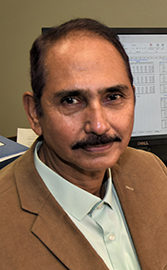
-
Prem Oli
- Assistant Professor
Forages- Data Science - Office:
- 1710 N FM 3053, Overton, TX
- Email:
- [email protected]
- Phone:
- 903-834-6191
- Graduate Education
- M.S. Crop Science, Wageningen University, 2000
- Ph.D. Agricultural and Biological Engineering, University of Florida, 2010
Professional Summary
Specialty: Forages – data science
Research:
My research efforts primarily involve agroecosystems modeling on forage-animal interface and sustainable cropping systems. At the AgriLife Research Center at Overton, a modeling team is involved in developing models on forage-animal and cropping systems. The models are driven by the access to and utilization of weather, forage production, grazing, and cattle daily gain data produced by AgriLife Research scientists over the past 50 years. The archival database, BeefSys, is a major source of over 45 years of soil-plant-animal experiment data. The data are a crucial element to the models, but our efforts are directed toward applying algorithms and functions that could potentially reveal prescribed decisions or options for cattle producers and other stakeholders for their specific conditions.
In the process of modeling forage-animal interface, we have developed a few daily nutritive value models for bermudagrass pasture and a daily gain model for stocker cattle grazing bermudagrass. By incorporating grazing-related parameters, we have modified the summative equation to estimate daily values of total digestible nutrients for bermudagrass pasture. Our modeling efforts on grazing systems continue to link animal growth models with crop growth models mainly in the Decision Support System for Agrotechnology Transfer (DSSAT) suite of crop models.
In the process of modeling forage-animal interface, we have developed a few daily nutritive value models for bermudagrass pasture and a daily gain model for stocker cattle grazing bermudagrass. By incorporating grazing-related parameters, we have modified the summative equation to estimate daily values of total digestible nutrients for bermudagrass pasture. Our modeling efforts on grazing systems continue to link animal growth models with crop growth models mainly in the Decision Support System for Agrotechnology Transfer (DSSAT) suite of crop models.
For studying sustainable cropping systems, we have been using mainly the DSSAT suite. We have conducted several simulation modeling studies on various forages such as bermudagrass, forage wheat, forage rye, and cowpea. In addition, we have incorporated a new model on forage wheat into the DSSAT system.
The future of my modeling efforts is directed toward collaborative efforts with other scientists and disciplines for estimates of lifecycle analyses and providing decision aids for farmers to help maximize the productivity and income of their agroecosystems while protecting the environment and enhancing the efficiency of the agricultural resource base. I intend to base my modeling efforts on the Climate-Smart approach, which will not only help make agroecosystems more resilient and adaptive to the ups and downs associated with climate change but also help mitigate the effects of greenhouse gas emissions by revealing outcomes under expected scenarios and presenting alternative solutions.